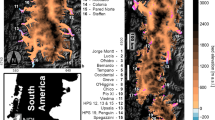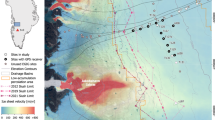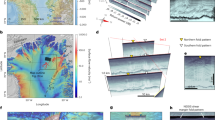Abstract
A VERY large tabular iceberg was observed as it drifted north-east of the Grand Banks of Newfoundland during May and June 1976. When the iceberg was first sighted on 12 May 1976 it showed only minor signs of deterioration. From 12 May until last sighted on 6 June the iceberg underwent a rapid reduction of the above water surface area with the erosion largely confined to the turbulent layer associated with gravity waves. The erosion progressed along lines parallel to the structure of the iceberg as indicated by the pronounced ridge pair seen in the photographs (Fig. 1), a trellis drainage pattern, and an alternation of light and dark bands over the entire surface of the iceberg.
This is a preview of subscription content, access via your institution
Access options
Subscribe to this journal
Receive 51 print issues and online access
$199.00 per year
only $3.90 per issue
Buy this article
- Purchase on Springer Link
- Instant access to full article PDF
Prices may be subject to local taxes which are calculated during checkout
Similar content being viewed by others
References
Lenczyk, R. E. Report of the International Ice Patrol Service in the North Atlantic Ocean (Season of 1964). Coast Guard Bul. No. 50 (1965).
Franceschetti, A. P. U.S. Coast Guard Oceanographic Report No. 5, 1–36 (1964).
Author information
Authors and Affiliations
Rights and permissions
About this article
Cite this article
ROBE, R., MAIER, D. & KOLLMEYER, R. Iceberg deterioration. Nature 267, 505–506 (1977). https://doi.org/10.1038/267505a0
Received:
Accepted:
Issue Date:
DOI: https://doi.org/10.1038/267505a0
This article is cited by
-
Melting of Antarctic icebergs
Nature (1978)
-
Upwelling by icebergs
Nature (1978)
Comments
By submitting a comment you agree to abide by our Terms and Community Guidelines. If you find something abusive or that does not comply with our terms or guidelines please flag it as inappropriate.



